
Dongge Dongmei Window Summer Bamboo Nanhua Qiushui Beiyuan Spring Mountain
If poetry is compared to a gorgeous brocade, then calligraphy and painting are the most beautiful embroideries on this brocade. I don’t know when, I gradually fell in love with calligraphy. Or invite three or two friends to go to a museum or exhibition room to wander in the palace of art; or lean on the sofa in front of the window, flip through a few calligraphy and paintings, or an ancient book, and let the ink and poetry flow. Not long ago, I had the honor to view Mr. Lu Jiande's recent works and feel the unique elegant, unrestrained, majestic and beautiful artistic style of Mr. Lu's calligraphy.
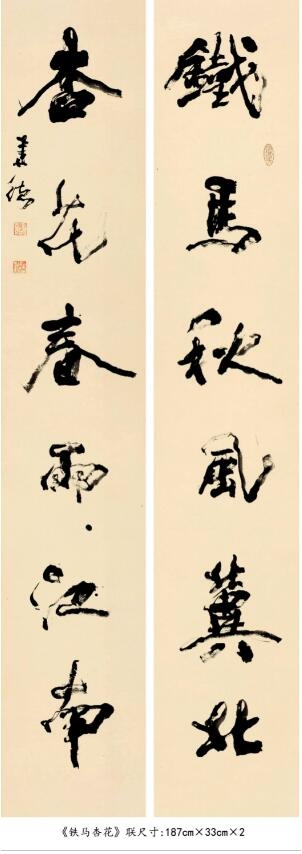
Horses in the autumn wind in northern Hebei, apricot blossoms in spring rain in the south of the Yangtze River
Mr. Lu Jiande is proficient in music and calligraphy. He inherited his family's education from a young age and has been practicing in the pond for decades. He has learned from the strengths of other families and formed his own unique style. Small regular script is derived from the Wei and Jin Dynasties, with references to the Sui and Tang Dynasties. It is square and upright, with a wind and spirit that overflows. It is simple but has fun, and is elegant but dignified. The running script blends the south into the north stele, and the stipples are strong and strong, combining hardness and softness, creating a natural beauty. The cursive script has a strange posture, with dragons flying and phoenixes dancing, and the brushstrokes falling off the paper are like clouds of smoke. "Watching the return home, I waved the five strings in my hand. I looked up and down with contentment, and my mind was too mysterious." As he said himself: "There is heaven and earth in the book, and all things come naturally. I write my thoughts, and the books are unified."
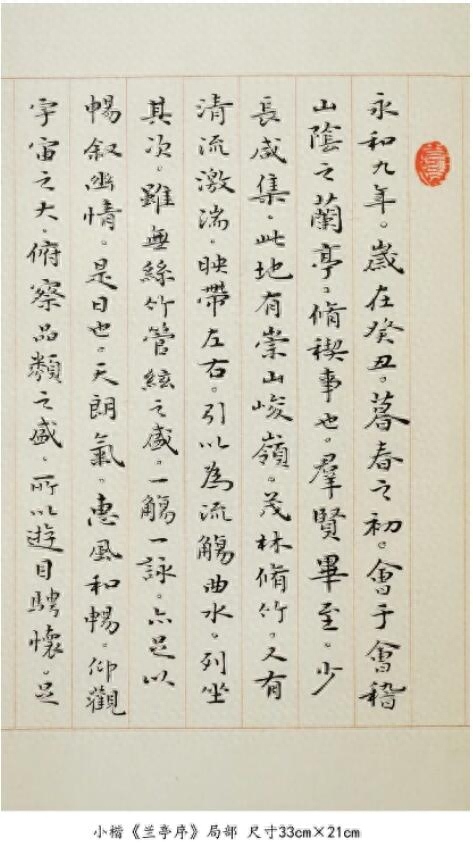
Wang Xizhi is an outstanding calligrapher in ancient my country and is known as the "Sage of Calligraphy". "Lanting Preface" is a popular prose, and it is also the most well-deserved running script in the world. In the ninth year of Yonghe in the Eastern Jin Dynasty, Wang Xizhi and 41 other people held a famous poetry and wine gathering in Lanting. The participants composed poems in the stream, expressed their feelings, and copied them into a collection. Wang Xizhi wrote a preface to the collection of poems. Looking at the "Preface to Orchid Pavilion" written by Mr. Lu Jiande, the bones are strong and steep, and it flows naturally, capturing the elegance and order of the Jin people. The subtle presence and absence of lines reflect the highest state of regular script.
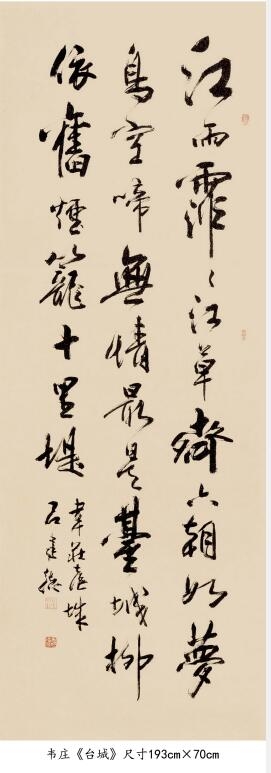
"The river is raining and the grass is flowing, the six dynasties are like a dream and the birds are singing in the sky. The most ruthless willows in Taicheng are still smoke cages ten miles away. The original site of Taicheng in the poem "Dike" is next to Xuanwu Lake in today's Nanjing City, connected with Jiming Mountain. From the Eastern Jin Dynasty to the Southern Dynasties, this place has always been the location of the forbidden province of the imperial court (the forbidden province was called Taicheng between the Jin and Song Dynasties, so the forbidden city was also called Taicheng) and the royal palace. Those extravagant emperors, like a competition, built luxurious, magnificent and splendid palaces in Taicheng one by one. By the mid-Tang Dynasty, the once prosperous Taicheng had become "weeds with thousands of households and doors". By the time of Weizhuang in the late Tang Dynasty, the place was even more desolate. I remember that more than 30 years ago, I stayed in Nanjing for five or six days. I paid homage to the ancient sites and visited various places of interest. I specifically went to the section to the north of Jiming Temple where it connected with the Ming City Wall to look for the Taicheng ruins. After careful observation, I found that the ruins at the ruins were The city bricks do have different specifications than those used in the nearby Ming Dynasty city walls.
The beginning of the sentence does not describe Taicheng in a positive way, but rather emphasizes the atmosphere. The spring rain in the south of the Yangtze River is dense and thin. In the falling rain silk, the surroundings are misty, like smoke and mist, giving people a dreamlike feeling and lingering emotions. In late spring in March, the green grass is green, showing the vitality of nature. The word "empty" in the second sentence, "birds crow in the sky", describes the loneliness and desolation of Taicheng, and deepens the sadness of "Six Dynasties Like a Dream". The emperors of the Six Dynasties who were pursuing pleasure in Taicheng have long become passers-by, and only the birds are still chirping happily. The word "most" highlights the "ruthlessness" of Diliu and the poet's sentimentality, and hints at the vicissitudes of life with the "stillness" of the prosperous and lush natural scenery. Integrating emotions into the scene, the everlasting willows on the long embankment form a sharp contrast with the fleeting luxury of the six generations. The "mercilessness" of things reflects the pain of people, and is full of sadness that mourns the past and hurts the present.

Wandering in the exhibition room, I admired it carefully. "Chu Sai and Xiang are connected, and Jingmen is connected to nine factions. The river flows beyond the sky and the earth, and the mountains are beautiful. The county and town of Fuqianpu are rippled in the sky. On a good windy day in Xiangyang, drunkenness and mountain old men are left behind." This song "Hanjiang River" "Looking" best represents the original style of Wang Wei's poetry. The poet describes the vast water potential of the Han River lying across the Chu River, connecting the "Three Xiangs" and the "Nine Pavilions", and the vast mountain scenery that flickers in and out, floating in front of the waterfront, surging and swaying with the sky in the distance. The city of Xiangyang, with light brushwork and light ink, blends painting into poetry and embodies emotions in the scenery. No wonder Wang Shizhen said: "The river flows beyond the sky and the earth, and the mountains are beautiful and indifferent. These are the poet's beautiful words, but they are included in the painting."
The whole poem is written in line drawing, starting from the big picture, using simplicity to control the complexity, and using form to express the freehand. It doesn’t even say whether the color of the mountain is green or purple, whether it is thick or light, but only whether it is there or not. It is really like an ink painting, everything is thick lines, and there is no sense of triviality. In the creation of landscape poetry, he started a generation of poetry style. He strives to outline a picture, express an artistic conception, and give people a coherent impression. As Shen Deqian, a man of the Qing Dynasty, commented, "Every time you don't put in the effort, you get it." As a carrier of articles, calligraphy can better demonstrate the extraordinary charm of famous poems and songs with the finishing touches of master calligraphers.
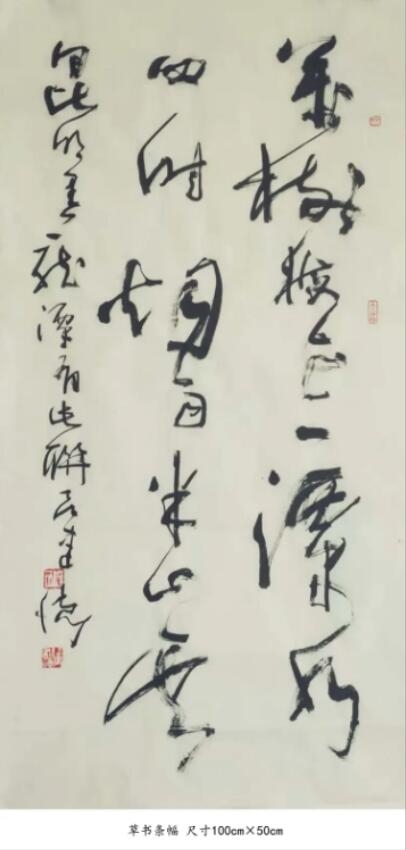
Thousands of plum blossoms, a pool of water, mist and rain at all times, clouds on the mountain< /span>
Lingering in the exhibition room, I watched carefully. The mind chases the artistic conception of the poem and the emotions follow the dots and strokes of ink. I can't help but think of a postscript written by Emperor Kangxi on Dong Qichang's ink: "Dong Qichang's calligraphy in Huating is completely different. His elegance and roundness are popular among Chu (chǔ paper) inkmen, and are beyond the reach of other calligraphers. Every time If you don't expect it, the wind spirit is unique. Like the breeze blowing and the gentle clouds rolling, it is quite natural."...
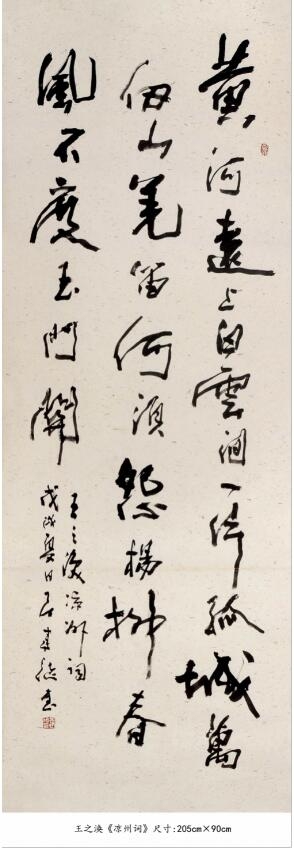
"Far above the Yellow River, among the white clouds, there is an isolated city called Wanren Mountain. Why should the Qiang flute blame the willows? The spring breeze does not pass through Yumen Pass" Wang Zhihuan's This frontier fortress poem is a treasure in Tang poetry. It led me to the northwest plateau and saw the surging Yellow River rushing from the sky, like a ribbon winding up into the clouds. Commensurate with the vast wilderness are towering mountains, which surround an isolated city. In contrast, the mountains look more majestic and majestic. "Yellow River" and "white clouds", "an isolated city" and "Wanren Mountain" are self-matching in the sentences, making the mind leap forward, and the ink of thousands of years is incorporated into the painting.
In ancient times, the northwest was sparsely populated and had an abnormal climate. However, the land was vast and the rivers and mountains were magnificent. It does not have the charming and pleasant scenery of Jiangnan, but it has a kind of captivating power, a kind of magnificence like "the lonely smoke in the desert, the sun setting over the long river". Mr. Lu Jiande's work is written in the Wei stele running script with rigorous structure, thick strokes, steady and generous, strong and straight. It is in the same line with Wang Zhihuan's ancient sentences. It is integrated and perfectly integrated, showing a majestic and grand artistic conception. The spirit of the Tang Dynasty makes people feel a faint bookish atmosphere from ancient times, and at the same time, they can appreciate the calligrapher's mind and magnanimity.
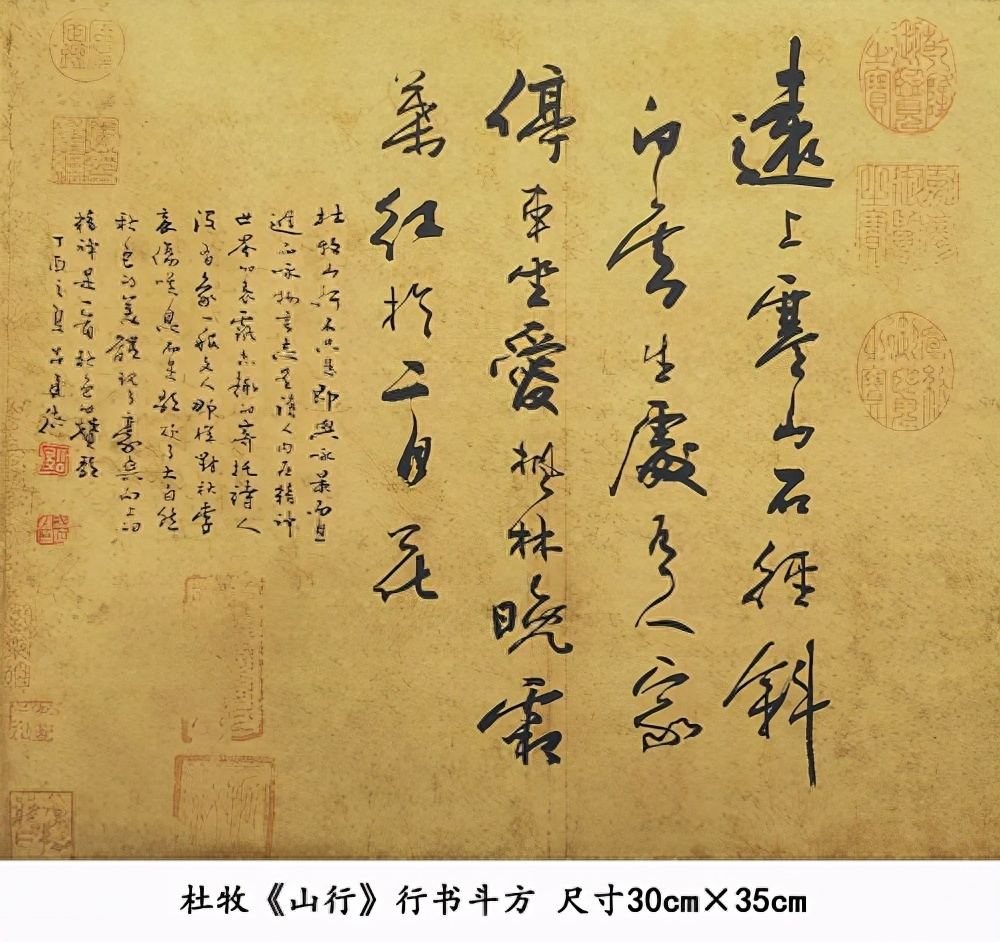
Frame by frame, Mr. Jiande's calligraphy varies with the poet's style, and some use the word "Wei Stele" "The brushwork is either vigorous or elegant; frame by frame, Mr. Jiande's brush strokes vary according to the picture, and some incorporate the charm of the "Two Kings", either delicate or bold. The clumsy lines contain unique elegance, and the broad-minded pointillism flows with ethereal poetry. "There are mountains and rivers, trees and clouds. The eyes return and return, and the heart breathes in and out" (Liu Xie's "Wen Xin Diao Long"). The ink interest of the book, the melody of music, and the artistic conception of poetry are intertwined.
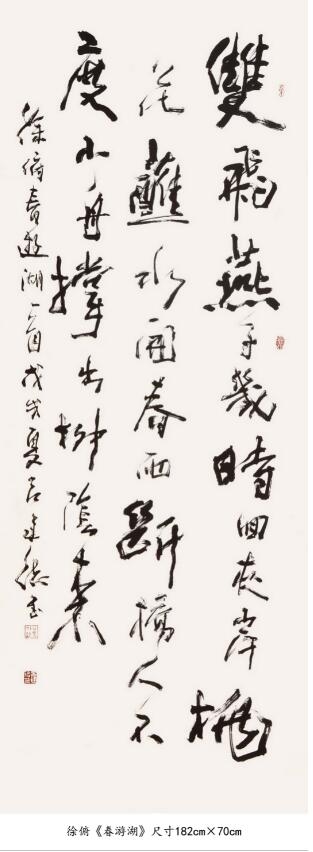
"When will the swallows fly back? The peach blossoms on the bank will bloom when dipped in water. The spring rain breaks the bridge but no one can save it, and the small boat pushes out of the willow shade. "Come" Northern Song Dynasty poet Xu Fu is far less famous than his uncle Huang Tingjian in literary history. Qian Zhongshu's "Selected Notes on Song Ci" contains one of his poems, namely "Spring Tour to the Lake". The poem describes the moving scenery on the lake in spring. It is cleverly conceived and full of interest, and has been recited for a while. The famous line in Zhang Yan's poem "Nanpu" of the Southern Song Dynasty, "The barren bridge cuts off the pond, and the willow shade supports a small boat" is derived from Xu Fu's poem. It emphasizes the "desolate" meaning of the broken bridge and the word "small" of the partial boat, and more clearly than Xu Fu's poem, it reveals the adjusting role of the sense of desolation in the red peach blossoms and green willows and the dialectical relationship between the small and the large in the composition of the poem.
The last two sentences reflect two important aesthetic characteristics of Chinese poetry art: First, the description of the scene must have tranquility in addition to beauty. Indifferent. The flowers are blooming and the swallows are flying, which is indeed beautiful, but there is no broken bridge and wild pond, which makes it less interesting. The second is to use reality to write virtuality, and virtuality and reality complement each other. As long as he writes about the leisurely form of the boat poled out in the willow shade, the vastness and tranquility of the water surface and the gloomy willow color of the lake will be as present as before. Just like this whole poem, only focusing on the scenery near the water highlights the spring scenery of the lake. "Spring Tour on the Lake" written by Mr. Jiande is sincere and natural, like a spring water flowing from the depths of the soul, crystal clear. Looking at it, it's like drinking mellow wine (chún láo) and getting drunk unconsciously.

Spring water fills the surrounding areas, and summer clouds have many strange peaks
The autumn moon shines brightly and the winter ridge shows the cold pines
Wandering in the exhibition room, which is full of poetry and ink soul, and light and heavy makeup is always suitable, it seems that you have come to the seaside of art. , just like leaning down to pick up exquisite shells on the vast beach. I turned over the sand and rocks, chased the waves, and looked for them on the beach, sometimes meditating and sometimes marveling. Amidst the sound of waves crashing on the shore, under the blue sky and the beautiful sun, in the vast and unfathomable ocean of art, I bent down to pick up exquisite shells one by one. Compare their shapes, examine their colors, pick, chase, a few waves... (Author: Duckweed)
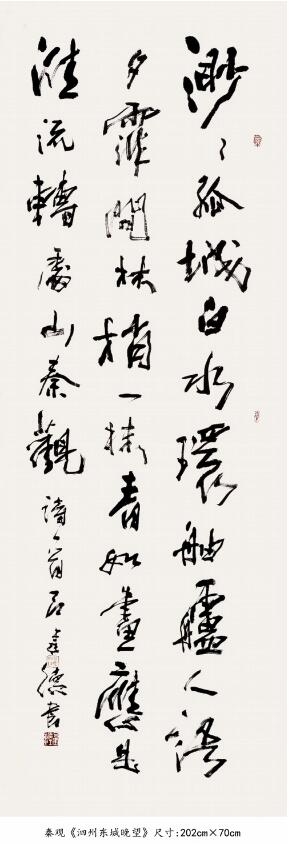
Lu Jiande, also known as Gongdu. He once served as secretary and president of the Confucius and Mencius Calligraphy and Painting Academy. He is currently the vice president of the Calligraphy and Seal Engraving Academy of the National Academy of Ethnic Painting. He is a national first-class artist, a member of the Chinese Calligraphers Association, a member of the Chinese Couplet Society, a member of the National Orchestra Society, and the vice president of the Chinese Cursive Calligraphy Art Research Association.
Articles are uploaded by users and are for non-commercial browsing only. Posted by: Lomu, please indicate the source: https://www.daogebangong.com/en/articles/detail/qian-qiu-bi-mo-ru-hua-tu-lyu-jian-de-shu-fa-shang-xi.html

 支付宝扫一扫
支付宝扫一扫 
评论列表(196条)
测试